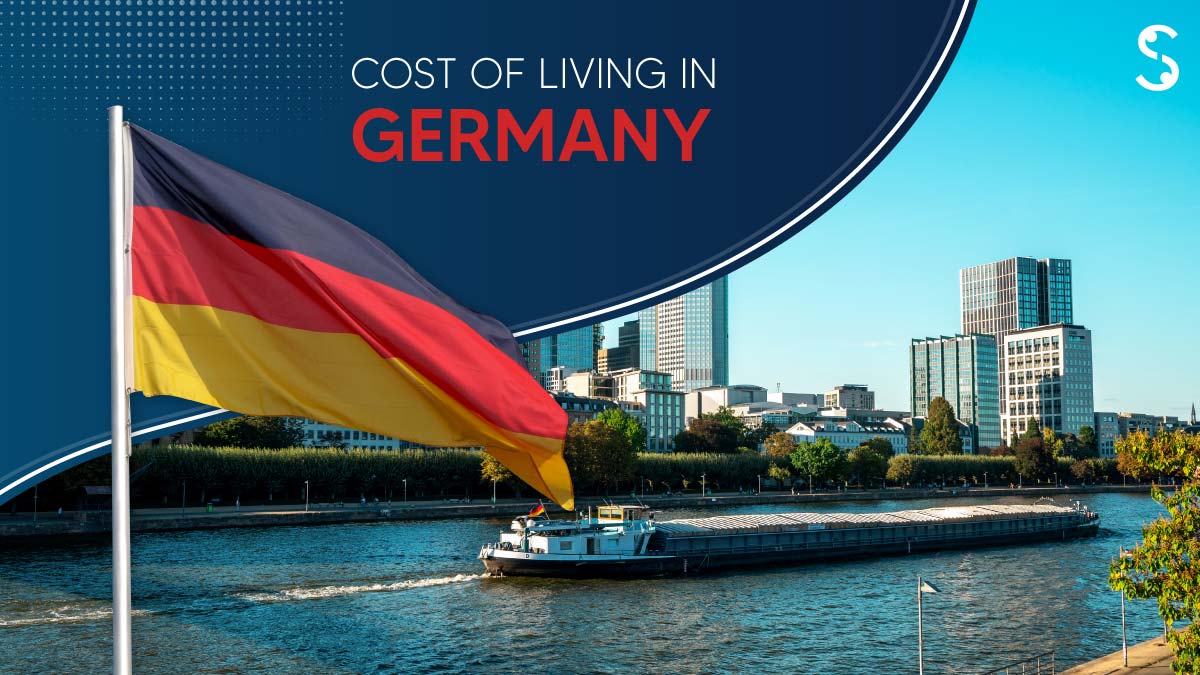
Cost of Living in Germany for Indian Student
Germany is a popular destination for international students, including many from India who are seeking quality education and exciting cultural experiences. However, before you pack your bags, it’s crucial to understand the cost of living in this vibrant country.
As we look ahead to 2025 and many more upcoming years, it’s essential to stay updated on the latest information regarding living expenses in Germany. From rent and groceries to transportation and entertainment, knowing the cost of living can help students better prepare for their time abroad.
So, let’s explore the updated cost of living in Germany for 2025 and other valuable information for students considering studying or living in Germany.
Why Germany is a Popular Destination for Indian?
Germany is a popular destination among international and Indian students for several reasons:
1. Affordable Education
Public universities in Germany charge little or no tuition fees which makes them a very attractive option compared to other Western countries. There are also scholarships available to help offset living costs.
2. Top-Ranked Universities
German universities are renowned for their high-quality education and rigorous academic programs. A degree from a German university is respected by employers worldwide.
3. English-Friendly Options
While learning German is definitely a plus, many universities offer programs taught entirely in English. This removes a language barrier for some international students.
4. Practical Learning
German universities often emphasize practical applications of knowledge, which can be appealing to students seeking real-world experience alongside theoretical knowledge.
5. Diverse Range of Programs
German universities offer a wide variety of academic programs taught in English, making it accessible to international students. Students have numerous options to choose from based on their interests and career goals.
6. Safe and Welcoming Environment
Germany is known for being a safe and tolerant country. The large international student population creates a welcoming and diverse atmosphere for students to live and study.
How much is student tuition fee in Germany?
In Germany, tuition fees for international and Indian students range from €5,000 to €20,000 (₹4,50,000 – ₹18,00,000) or more per year, depending on whether you choose a public or private university. Public universities in Germany generally have no tuition fees for undergraduate and master’s programs for both domestic and international students.
Private universities set their own tuition fees. These can vary depending on the specific program, university, and nationality.
Here’s a list of top 12 German universities in 2025 along with their estimated fees & specialization.
| University Name | Location | Estimated Annual Fees (INR) | Course Specialization |
| Technische Universität München (TUM) | Munich | 1,20,000 – 1,80,000 | Engineering, Computer Science, Management |
| Ludwig-Maximilians-Universität München (LMU Munich) | Munich | 80,000 – 1,20,000 | Humanities, Social Sciences, Natural Sciences |
| Heidelberg University | Heidelberg | 80,000 – 1,20,000 | Medicine, Law, Humanities |
| Karlsruhe Institute of Technology (KIT) | Karlsruhe | 1,00,000 – 1,50,000 | Engineering, Natural Sciences, Economics |
| RWTH Aachen University | Aachen | 1,00,000 – 1,50,000 | Engineering, Natural Sciences, Medicine |
| Technische Universität Berlin (TU Berlin) | Berlin | 80,000 – 1,20,000 | Engineering, Natural Sciences, Humanities |
| Eberhard Karls Universität Tübingen | Tübingen | 80,000 – 1,20,000
|
Medicine, Humanities, Social Sciences |
| Albert-Ludwigs-Universität Freiburg | Freiburg | 80,000 – 1,20,000 | Medicine, Humanities, Natural Sciences |
| Technische Universität Dresden | Dresden | 80,000 – 1,20,000 | Engineering, Natural Sciences, Humanities |
| University of Erlangen-Nürnberg | Erlangen | (Semester fees) 12,000 – 18,000 | Humanities, Social Sciences, Natural Sciences |
| Universität Stuttgart | Stuttgart | 80,000 – 1,20,000 | Engineering, Natural Sciences, Humanities |
| Humboldt-Universität zu Berlin | Berlin | 80,000 – 1,20,000 | Humanities, Social Sciences, Natural Sciences |
For private universities, expect to pay between €20,000 to €40,000 (₹18,00,000 – ₹36,00,000) per year for a bachelor’s or master’s degree at a private university.
Worried about choosing the right university in Germany? Talk to our expert today at Shuraa Education.
Cost of Living in Germany for Indian Students
The cost of living in Germany for Indian students can range between ₹88,000 to ₹1,30,000 (€980 to €1,500) per month. Here is the estimated cost of living in Germany for a single person in 2025, including accommodation, utilities, transportation, food, and other expenses.
1. Accommodation Cost
Accommodation is a significant expense in Germany, but it can vary greatly depending on several factors:
- City: Major cities like Munich and Frankfurt will have considerably higher rents compared to smaller towns or cities in eastern Germany.
- Apartment Type: A studio apartment will obviously be cheaper than a spacious 3-bedroom flat.
- Location: Even within a city, rents can fluctuate based on proximity to the city centre, amenities, and overall desirability of the neighbourhood.
Rough estimate for average monthly rent for a one-bedroom apartment in different cities in Germany:
- Berlin: ₹72,000 – ₹1,08,000
- Munich: ₹90,000 – ₹1,35,000+
- Frankfurt: ₹76,500 – ₹1,17,000
- Hamburg: ₹67,500 – ₹99,000
- Bremen: ₹54,000 – ₹81,000
On average, expect to pay between €850 and €1,300 (₹76,500 – ₹1,17,000) per month for a one-bedroom apartment. This can range from as low as €400 (₹36,000) in suburbs of eastern cities to €2,500 (₹2,25,000) for a spacious, modern apartment in Munich’s city centre.
Indian students in Germany often opt for student dorms or shared apartments to manage living costs.
- Student Dorms: These offer affordable housing, typically costing around €300 per month for a single room.
- Shared Apartments (WGs or Wohngemeinschaft): Sharing an apartment with roommates (often in larger apartments) is another option. Rent can vary depending on the size of the apartment and your room, but it’s generally cheaper than renting alone.
(These are just averages, and the actual rent you pay can be higher or lower depending on the specific property and negotiation with the landlord)
2. Food
The cost of food in Germany is generally considered moderate and can vary depending on your dietary habits and shopping preferences.
Average Monthly Grocery Budget
-
Single Person: A single student can expect to spend between €250 and €400 (₹22,500 – ₹36,000) per month on groceries. This allows for a mix of basic staples, fresh produce, and occasional treats.
-
Family: Grocery costs for a family will naturally be higher. A ballpark figure would be around €500 – €800 (₹45,000 – ₹72,000) per month, depending on family size and dietary needs.
Factors Affecting Grocery Costs
- City: Bigger cities like Munich tend to have slightly more expensive groceries compared to smaller towns.
- Shopping Habits: Cooking at home is significantly cheaper than eating out regularly. Sticking to seasonal produce and opting for store brands can also help stretch your budget.
- Dietary Preferences: If you have specific dietary needs or a taste for imported goods, expect to pay more. Indian students might find some familiar ingredients at ethnic grocery stores, but these can be pricier than local options.
Dining out can be expensive compared to cooking at home. A casual restaurant meal might cost around €15–€20 (₹1,350 – ₹1,800) per person, while a nicer sit-down experience can range from €25–€50+ (₹2,250 – ₹4,500+) or more.
Saving Tips
- Cooking at home is the most budget-friendly option. Utilize grocery store flyers and discount stores like Aldi or Lidl.
- Many universities have cafeterias (Mensa) offering subsidized meals at a much lower cost than restaurants.
- Fresh produce can be more affordable at farmer’s markets, especially towards the end of the selling day.
3. Utilities (Electricity, Water, Internet)
Here’s a breakdown of average monthly costs to give you a general idea:
1. Total Utilities
Expect to pay somewhere between €150 and €250 (₹13,500 – ₹22,500) per month for combined utilities (electricity, water, garbage collection) in a moderately sized apartment (around 80 square meters).
2. Electricity
Electricity costs can vary depending on usage, but an average might be around €50–€80 (₹4,500 – ₹7,200) per month.
3. Water and Garbage Collection
These are usually bundled together and can cost around €30–€50 (₹2,700 – ₹4,500) per month.
4. Heating
Heating costs can vary greatly depending on the season and efficiency of your building’s heating system. In winter months, expect heating to be a major contributor to your utility bill, potentially reaching €50–€100 (₹4,500 – ₹9,000) per month or more.
5. Internet
Internet plans typically range from €20–€40 (₹1,800 – ₹3,600) per month, depending on the provider and internet speed. Some landlords might include internet in the rent.
Tips to Save on Utilities:
- Look for energy-efficient apartments with good insulation.
- Be mindful of your electricity consumption: switch off lights and electronics when not in use, take shorter showers, etc.
- Consider adjusting your heating thermostat, especially during warmer months.
- Compare internet providers and choose a plan that suits your needs.
4. Transportation
Public transportation is the most popular and economical way for students to get around in Germany. Single tickets for buses, trams, or subways typically cost between €1–€2 (₹90 – ₹180) depending on the city and distance travelled.
Monthly passes are a much more economical option for frequent travellers. These can vary depending on the city and zone coverage but generally range from €50–€90 (₹4,500 – ₹8,100) per month.
Deutschlandticket
Germany recently introduced a nationwide ticket called the Deutschlandticket, specifically aimed at making public transport more affordable. Starting from April 2025, students can purchase this ticket for a significantly reduced price of €29.40 (₹2,625) per month.
This ticket allows unlimited travel on all local public transport throughout Germany.
5. Other Expenses (Insurance, Clothing, Entertainment)
Beyond the major categories like rent, food, and transportation, there are other expenses to factor into your cost of living in Germany as an international student. This may include:
1. Health Insurance
All students in Germany are required to have health insurance. This typically costs around €80–€100 (₹7,200 – ₹9,000) per month.
2. Phone and Internet
Phone plans: Around €30 per month (₹2,700) and Internet: €20–€40 per month (₹1,800 – ₹3,600), depending on the provider and plan.
3. Clothing
Clothing costs can vary depending on your style and shopping habits. Germany has a range of clothing stores from budget-friendly options like H&M to high-end designer brands.
4. Entertainment
Entertainment costs will depend on your preferences. Movie tickets can range from €8–€12 (₹720 – ₹1,080), while nights out at bars or clubs can add up quickly.
5. Miscellaneous
Budget for additional miscellaneous expenses like toiletries, personal care items, stationery, and occasional travel outside your city.
Please note all these costs are estimates. The overall cost of living in Germany for a single person can vary within each country depending on the specific city, region, or many other factors. However, as a general trend, Germany offers a more attractive proposition for students seeking a high-quality education without a crippling financial burden.
Your Affordable German Education Starts Here!
Living and studying in Germany can be an enriching and affordable experience for international students. From free or very low tuition fees at public universities to a relatively manageable cost of living, Germany stands out as a budget-friendly option compared to many other popular study destinations.
However, it’s also crucial to consider factors like city choice, and personal habits as they can influence your overall costs.
If you are considering studying or working in Germany, consider reaching out to Shuraa Education. Our expert counselling and application management services take the stress out of the process. We’ll guide you through everything from application requirements and budgeting to visa assistance and finding suitable accommodation.
Get a Free consultation today at +91 931 999 8924 or info@shuraaeducation.com and let us turn your dream of studying in Germany into a reality.
Let's Plan Your Study Abroad Journey!
Please leave your details and we will contact you shortly!
Categories
Trending Post
Latest Post

How to Study Abroad for Free or Cheap in 2026?
Many students believe that studying abroad is only for people with a lot of money. The high fees, expensive lifestyle, and foreign currencies can make it feel scary and impossible. Because of this, many students drop the idea without even checking what options are actually available. But the truth is – Studying abroad is much more […]
Read More
UCD Dublin Rankings, Fees, Courses & Reviews for Indian
For Indian students planning to study in Dublin, University College Dublin (UCD) stands out as a top choice for quality education and global exposure. As Ireland’s most globally connected university, UCD attracts students from around the world through its strong focus on research, innovation, and real-world impact. The campus culture is spirited and inclusive, making […]
Read More
List of 10 Financial Documents Required for Study Abroad Applications
Planning to study abroad is exciting, but before you pack your bags, there’s one critical step you can’t skip: proving your financial readiness. Universities and immigration authorities want assurance that you can comfortably cover tuition fees, living expenses, and other costs throughout your studies. That’s where the financial documents required for study abroad come in. These documents form the backbone of your […]
Read More
